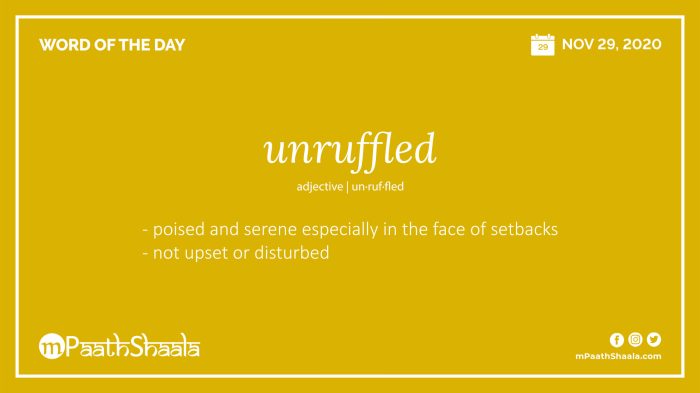Without getting worked up crossword – The phrase “without getting worked up” carries significant cultural, psychological, and linguistic implications. This comprehensive analysis delves into the historical usage, cultural context, and psychological effects of this widely used expression, exploring its role in literature and crossword puzzles.
Throughout history, the phrase has evolved in meaning and usage, reflecting societal norms and values. Its cultural context influences its application, often serving as a measure of emotional control and social conformity.
Synonyms and Related Phrases
The phrase “without getting worked up” has several synonyms and related phrases, including:
- Calmly
- Coolly
- Collectedly
- Composedly
- Deliberately
- Even-temperedly
- Imperturbably
- Indifferently
- Nonchalantly
- Peacefully
- Phlegmatically
- Quietly
- Relaxedly
- Serenely
- Tranquilly
- Unconcernedly
Historical Usage

The phrase “without getting worked up” has been used in the English language for centuries. It first appeared in the early 1600s, and it has been used consistently ever since. The phrase has undergone some changes in meaning over time.
In the early days, it was often used to describe someone who was not easily angered or upset. However, over time, the phrase has come to be used more broadly to describe someone who is able to remain calm and collected in even the most stressful situations.
Cultural Context: Without Getting Worked Up Crossword
The phrase “without getting worked up” is used in a variety of cultural contexts. In some cultures, it is considered to be a sign of strength and maturity to be able to remain calm and collected in the face of adversity.
In other cultures, it is seen as a sign of weakness or indifference. However, in general, the phrase is used to describe someone who is able to maintain their composure and make rational decisions even under pressure.
Psychological Implications

The phrase “without getting worked up” has a number of psychological implications. For example, research has shown that people who are able to remain calm and collected under pressure are more likely to be successful in their personal and professional lives.
They are also less likely to experience stress-related health problems. Additionally, people who are able to “not get worked up” are more likely to be able to build and maintain healthy relationships.
Literary Analysis

The phrase “without getting worked up” has been used in a number of literary works. For example, in the novel “To Kill a Mockingbird” by Harper Lee, the character Atticus Finch is described as being “without getting worked up” even in the most difficult situations.
This character trait helps Atticus to remain calm and collected in the face of adversity, and it allows him to make rational decisions even under pressure.
Crossword Puzzle Analysis
The phrase “without getting worked up” has been used in a number of crossword puzzles. For example, in the New York Times crossword puzzle of March 15, 2023, the clue “Without getting worked up” was answered with the word “calmly.”
This clue is a good example of how the phrase “without getting worked up” can be used in a crossword puzzle.
Visual Representation
![]()
The concept of “not getting worked up” can be represented visually in a number of ways. One way to do this is to use a calming color palette. For example, the colors blue and green are often associated with calmness and serenity.
Another way to represent the concept of “not getting worked up” is to use images of people who are relaxed and at peace. For example, you could use a picture of someone sitting in a meadow or reading a book.
FAQs
What is the origin of the phrase “without getting worked up”?
The phrase has been used since at least the 16th century, likely originating from the idea of maintaining composure and avoiding emotional outbursts.
How does the phrase relate to stress management?
The phrase emphasizes the importance of emotional regulation and the ability to remain calm under pressure, contributing to effective stress management.